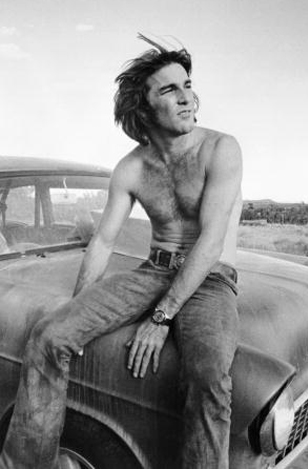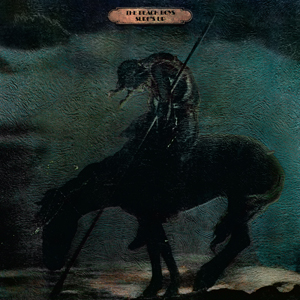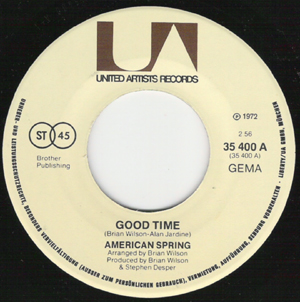Related Research Articles

The Beach Boys are an American rock band that formed in Hawthorne, California, in 1961. The group's original lineup consisted of brothers Brian, Dennis, and Carl Wilson, their cousin Mike Love, and friend Al Jardine. Distinguished by their vocal harmonies, adolescent-oriented lyrics, and musical ingenuity, they are one of the most influential acts of the rock era. They drew on the music of older pop vocal groups, 1950s rock and roll, and black R&B to create their unique sound. Under Brian's direction, they often incorporated classical or jazz elements and unconventional recording techniques in innovative ways.

Dennis Carl Wilson was an American musician, singer, and songwriter who co-founded the Beach Boys. He is best remembered as their drummer and as the middle brother of bandmates Brian and Carl Wilson. Dennis was the only true surfer in the Beach Boys, and his personal life exemplified the "California Myth" that the band's early songs often celebrated. He was also known for his association with the Manson Family and for co-starring in the 1971 film Two-Lane Blacktop.

Friends is the fourteenth studio album by American rock band the Beach Boys, released on June 24, 1968, through Capitol Records. The album is characterized by its calm and peaceful atmosphere, which contrasted the prevailing music trends of the time, and for its brevity, with five of its 12 tracks running less than two minutes long. It sold poorly, peaking at number 126 on the Billboard charts, the group's lowest U.S. chart performance to date, although it reached number 13 in the UK. Fans generally came to regard the album as one of the band's finest.

Holland is the 19th studio album by American rock band the Beach Boys, released January 8, 1973 on Brother/Reprise. It is their first album recorded without Bruce Johnston since 1965, their second with Blondie Chaplin and Ricky Fataar, and their final studio album created under the de facto leadership of Carl Wilson and manager Jack Rieley. The LP was originally packaged with a bonus EP, Mount Vernon and Fairway, which consisted of a 12-minute fairy tale written and produced by Brian and Carl Wilson.

Surf's Up is the 17th studio album by American rock band the Beach Boys, released on August 30, 1971 on Brother/Reprise. It received largely favorable reviews and reached number 29 on the U.S. record charts, becoming their highest-charting LP of new music in the U.S. since 1967. In the UK, Surf's Up peaked at number 15, continuing a string of top 40 records that had not abated since 1965.

Carl and the Passions – "So Tough" is the 18th studio album by American rock band the Beach Boys, released May 15, 1972 on Brother/Reprise. The album is a significant musical departure for the band and is the first to feature the Flames' Blondie Chaplin and Ricky Fataar as additions to their official line-up. It sold poorly and was met with lukewarm reviews, but later gained stature as a cult favorite among fans.

15 Big Ones is the 20th studio album by the American rock band the Beach Boys, released July 5, 1976 on Brother/Reprise. It includes a mix of original songs and renditions of rock 'n' roll and R&B standards. The LP was the band's first album with production credited solely to Brian Wilson since Pet Sounds (1966). As such, its release was accompanied by a controversial media campaign that declared his comeback as an active member of the Beach Boys' recording and touring group.

The Beach Boys Love You is the 21st studio album by American rock band the Beach Boys, released April 11, 1977, on Brother/Reprise. Sometimes called the band's "punk" or "synth-pop" album, Love You is characterized for its pioneering use of synthesizers and its juxtaposition of adolescent-oriented lyrics with the adult band members' gravelly vocals.

L.A. is the 23rd studio album by the American rock band the Beach Boys, released on March 16, 1979, and their first issued through CBS Records. Recorded during a period of acrimony between the band members, it was a critical and commercial failure, peaking at number 100 in the U.S. and number 32 in the UK.

M.I.U. Album is the 22nd studio album by American rock band the Beach Boys, released on September 25, 1978. Characterized for its easy-listening sound, the album was produced by Al Jardine and touring member Ron Altbach during one of the most acrimonious periods in the band's history. It sold poorly, peaking at number 151 in the U.S, and was met with confused reactions from critics and fans.

All Summer Long is the sixth album by American rock band the Beach Boys, released July 13, 1964 on Capitol Records. Regarded as their first artistically unified collection of songs, as well as one of the first true concept albums, it marked the Beach Boys' first LP that was not focused on themes of cars or surfing. Instead, the songs are semi-autobiographical and relate to the experiences of a typical Southern Californian teenager, a theme encapsulated by the title track, "All Summer Long", and the often-imitated front cover, a modernist style photo collage depicting the band members fraternizing with young women on a beach.

Brian Wilson is the first solo album by American musician Brian Wilson of the Beach Boys, released July 12, 1988 by Sire and Reprise Records. Promoted as a spiritual successor to his band's 1966 release Pet Sounds, the album is characterized for its rich, synthesizer-heavy orchestrations. It cost over $1 million to record and was the first album produced by Wilson since The Beach Boys Love You (1977). His former psychologist, Eugene Landy, was credited as "executive producer".
"Wake the World" is a song by American rock band the Beach Boys from their 1968 album Friends. It was written by Brian Wilson and Al Jardine about getting up in the morning for work. In addition to appearing on Friends, "Wake the World" was released as B-side to "Do It Again" in July 1968. The song has since appeared multiple times on the band's live setlists and has been described as a cult favorite.
"Our Sweet Love" is a song by the American rock band the Beach Boys from their 1970 album Sunflower. Written by Brian Wilson, Carl Wilson, and Al Jardine, "Our Sweet Love" features a lush sound that has been compared to the band's work on Pet Sounds. Brian Wilson originally left the song unfinished, resulting in the band completing it for Sunflower. Carl Wilson sings the song's lead vocal.
"Girls on the Beach" is a song by the American rock band the Beach Boys from their 1964 album All Summer Long. Written by Brian Wilson and Mike Love, the song is in the vein of the band's previous surf ballads and features Four Freshmen-inspired harmonies. The song also served as the title track to the movie The Girls on the Beach.
"Let Him Run Wild" is a song by the American rock band the Beach Boys from their 1965 album Summer Days . Written by Brian Wilson and Mike Love, it was issued as the B-side to "California Girls".

"Had to Phone Ya" is a song by the American rock band the Beach Boys from their 1976 album 15 Big Ones. It was written by Brian Wilson, his sister-in-law Diane Rovell, and Mike Love. The song was issued as the B-side to their single "It's O.K.". An earlier recording by the group American Spring was included as a bonus track on a later reissue of the album Spring (1972).

"Good Time" is a song by American pop music duo American Spring from their 1972 album Spring. It was written by Brian Wilson and Al Jardine originally for the Beach Boys' album Sunflower (1970). In 1972, Spring released "Good Time" as their second single, recording their voices atop the Beach Boys' instrumental track. In 1977, the Beach Boys released their original version of the song on the album The Beach Boys Love You.

Adult/Child is an unreleased studio album by the American rock band the Beach Boys that was produced in early 1977. Similar to the release it was meant to follow, The Beach Boys Love You, the album is essentially a semi-autobiographical solo effort by the band's chief songwriter and producer, Brian Wilson. The title refers to a theory that one's personality can be split into "adult" and "child" modes of thinking.

Lei'd in Hawaii is an unfinished live album by American rock band the Beach Boys that was produced shortly after the completion of their 1967 studio album Smiley Smile. It was initially planned to include the band's first live concert performances since their tour of Europe in May 1967.
References
- 1 2 Diken, Dennis; Buck, Peter (2000). 15 Big Ones/Love You (booklet). The Beach Boys. California: Capitol Records. p. 2.
- 1 2 Gaines, Steven (1986). Heroes and Villains: The True Story of The Beach Boys . New York: Da Capo Press. pp. 249, 280. ISBN 0306806479.
- ↑ Leaf, David (2022). God Only Knows: The Story of Brian Wilson, the Beach Boys and the California Myth (3rd ed.). Omnibus Press. ISBN 9781913172756.
- ↑ Hopkins, Adrian (2012). The Little Black Songbook: The Beach Boys. Wise Publications. pp. 191–192. ISBN 9780857129543.
- ↑ Doe, Andrew; Tobler, John (2004). Brian Wilson and the Beach Boys: The Complete Guide to Their Music . p. 96. ISBN 9781844494262.
- ↑ Stebbins, Jon (2000). Dennis Wilson: The Real Beach Boy . ECW Press. p. 155. ISBN 978-1-55022-404-7.
- ↑ Carlin, Peter Ames (2006). Catch a Wave: The Rise, Fall, and Redemption of the Beach Boys' Brian Wilson . Rodale. ISBN 978-1-59486-320-2.
- ↑ Hughes, Rob (November 22, 2012). "Brian Wilson – Album By Album". Uncut.
- ↑ Kempke, D. Erik (August 15, 2000). "The Beach Boys: 15 Big Ones/Love You : Album Reviews". Pitchfork Media . Retrieved October 27, 2012.
- ↑ Sharp, Ken (January 2, 2009). "Brian Wilson: God's Messenger". American Songwriter .
- ↑ Wilson, Brian; Greenman, Ben (2016). I Am Brian Wilson: A Memoir . Da Capo Press. ISBN 978-0-306-82307-7.
- ↑ Marchese, Joe (April 26, 2022). "Right Where He Belongs: Brian Wilson's "Long Promised Road" Soundtrack Comes to CD in June". Second Disc. Retrieved June 19, 2023.
- ↑ Sharp, Ken (July 28, 2000). "Alan Jardine: A Beach Boy still riding the waves". Goldmine . Archived from the original on January 9, 2013.